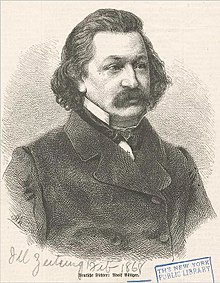Adolf Boettger
Adolf Böttger (born May 21, 1815 in Leipzig , † November 16, 1870 in Gohlis , today in Leipzig) was a German poet, playwright and translator. He is considered a "forgotten poet of romanticism". Böttger translated the works of Lord Byron and John Milton into German.
Life
His father, not unknown as an English lexicographer, was a tax collector. He received his education at the Thomasschule in his hometown, whose university he also attended without devoting himself to a particular discipline. The newer languages, and among them English, above all, attracted him and made him a celebrated translator without taking away his creative power. Böttger almost never left his hometown, as did his life in general without any particularly strange external fate, but also without any brilliant recognition in increasingly narrowing circles. Almost alone and sunk in misery, he passed away at Gohlis near Leipzig, where he had retired last year. His translation of the works of Lord Byron, which first appeared in 1840, but was then published several times, first opened up the depth of this great poet to the German people and was exemplary except for Gildemeister . Likewise, translations of Popes (1842), Goldsmiths (1843), Milton's (1846), Ossians (1847), Longfellow's “Hiawatha” (1856), as well as individual dramas by Shakespeare in their fluent, elaborate form are evidence that the translator was also a poet . Only in 1853 did he translate Racine's “ Phaedra ” and Ponsard's “Odysseus” from French . As a freelance poet, Böttger first appeared in the “Poems” in 1846, the melodic form of which - although the content is sometimes incorrect - has an attractive effect. For a genre of poetry, which Gottschall called flower poetry, Böttger gave the first impetus with the two larger poems "Hyacinth and Lilialide" (1849) and "The Pilgrimage of the Spirits of Flowers" (1851). But what was deeply felt and vividly portrayed in him was flattened by his nightmare. Böttger turned to poetic narrative with particular preference, in the epic-lyrical poems "Pausanias" (1852), "Habana" (1853), "The Fall of Babylon" (1855) and "The Daughter of Cain" (1865) . Deviating from this is the idyll “Goethe's Jugendliebe” (1861), whose style is excellent, whose pictures are neatly executed. The unfinished satirical epic “Till Eulenspiegel” (1850) and his swan song “The Hangman” (1870) should also be mentioned. The drama “Agnes Bernauer” (1850) can be added to these excellent poems. He published his “Gesammelte Werke” (Leipzig 1864–1866), again without the profit he had hoped for.
Robert Schumann's Spring Symphony was inspired by a fresh, cheerful, optimistic spring poem by Adolf Böttcher.
In 1865 Dürr in Leipzig published his Gesammelte Dichtungen in six volumes, and in 1889 by Knaur in Leipzig a second edition, also in six volumes.
literature
- Johann Friedrich Ludwig Theodor Merzdorf: Böttger, Adolf . In: Allgemeine Deutsche Biographie (ADB). Volume 3, Duncker & Humblot, Leipzig 1876, p. 201 f.
Individual evidence
- ^ Margit L. McCorkle , Robert Schumann. Thematic bibliographical catalog of works , Munich / Mainz 2003, p. 160
Web links
- Literature by and about Adolf Böttger in the catalog of the German National Library
- Works by and about Adolf Böttger in the German Digital Library
- Poem example from the Freiburg anthology of the University of Freiburg
- Poem The Gnome and the Lizard in the Gutenberg-DE project
- Works by Adolf Böttger in the Gutenberg-DE project
See also:
- Agnes Bernauer (Böttger wrote a drama of the same name in 1846)
| personal data | |
|---|---|
| SURNAME | Böttger, Adolf |
| BRIEF DESCRIPTION | German poet, playwright and translator |
| DATE OF BIRTH | May 21, 1815 |
| PLACE OF BIRTH | Leipzig |
| DATE OF DEATH | November 16, 1870 |
| Place of death | Gohlis |
